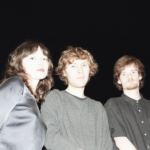Artist Interview: Microwave
Posted: by The Alt Editing Staff

Photo by Sarah Knoll
Microwave isn’t the band you want them to be. Each new record–hell, each new single–seems to be a chance for the Atlanta trio to reinvent themselves, from the poppy alt-rock of Stovall to the genre pastiche of Much Love to the metallic grunge of Death Is a Warm Blanket. The band’s most recent singles have seen the band stray into a groovier, more chill direction. Their penchant for changing up their sound landed them on our most anticipated list for 2023, and it’s solidified 2016’s Much Love as something of a modern classic. So much so, in fact, that it’s getting a fancy new reissue courtesy of original label SideOneDummy, with updated artwork and a couple of acoustic cuts. We caught up with the band right after the reissue’s announcement (but before the semi-surprise drop of new single “Ferrari”) to discuss that record’s place in the band’s legacy and their future–for the rest of 2023 and beyond. For now, though, they’re about to embark on a headlining tour with Oso Oso, Delta Sleep, and Mothé beginning tomorrow.
How’d the reissue come to be in the first place?
Nathan Hardy: I think a big part of it was, looking back, we thought the original album art was ironic and funny–which it is! It’s still incredible–but it doesn’t quite match the tone of the record. We’ve always wanted, in the back of our minds, to do something more serious. We love God’s Teeth. I’ve been following his Instagram for a while, and we thought his style would be cool.
Had you guys ever talked before?
NH: Never. Our manager reached out to him. We’ve never spoken in person.
Then it’s got acoustic takes of “Dull” and “Wrong,” right?
NH: Yeah. The old Glow in the Dark Studios, where Matt Goldman recorded that Underoath record and stuff, it’s a small studio and our friend Chris Bowman, who did sound on our tour with Four Year Strong, did a podcast called Sushi for Breakfast. He was doing acoustic versions of songs for it, and he recorded those in Glow in the Dark.
I know you put out Stovall on your own, and now the Much Love reissue is the first thing SideOneDummy’s put in seven or six years. That record’s crazy big now. What was that jump like for you guys? From a fan perspective, it seemed to be an overnight explosion for you.
NH: We recorded that record–the day we finished recording we went out with The Wonder Years and letlive. on a tour.
Tyler Hill: That was our second-ever US tour.
NH: Damn, yeah. Right after that tour we were out with Motion City Soundtrack for like two and a half weeks. It was a bunch of touring. We hit it real hard before the record even came out. It does feel like the start of when we began taking it seriously, making it a career. It was cool! We for sure put a lot into Much Love at the time. Travis Hill, who was playing in the band starting in maybe 2017, recorded the record, and he put in so much time. We figured we’d just been signed to a label so we had to do our best. We didn’t sleep. You only got one shot–don’t miss your chance to blow it!
Much Love in particular feels like it really runs the gamut of all the sounds you guys have played with over the years. Are there any songs, or moments in songs, you feel proudest of seven years removed?
NH: To speak to how it’s all over the place, I think that was part of the idea. At the time–and still today–it’s been about exploring what we can do. We have no interest in having a clearly identifiable sound. I love Ween. They’re a top five band, and since I was fourteen. They have no Ween sound. They can do a country album and then flamenco guitar songs. They’re an all over the place band. It always seemed to me to be cool to have no notions of what you do when you’re writing. We can do a rap song! I even feel like part of “Lighterless” feels like rap when I do it live. I think that record especially I was worried that it wasn’t cohesive. I thought it was too all over the place. I guess there’s a common lyrical thread, a darker feeling there. Even the happy-go-lucky songs are depressing. And that’s why we wanted that artwork too.
I’m willing to bet “Lighterless” is still your most played on Spotify, and you guys close almost every show with “Vomit,” right?
TH: I’d say 90% of shows played after Much Love came out have been closed with that, yeah.
What are your favorites off the album to play live?
TH: We’ve been rehearsing for our headliner coming up, and we’re playing songs we’ve not played in a long time. One is “Neighbors” and I forgot how much I like that one. It’s been probably five years since we’ve played it. It’s cool to dig out some of those deep cuts.
NH: “Vomit” is probably the most fun. The heavier ones are always more fun.
Tito Pittard: I like “Float to the Top.”
TH: That’s not on the record!
TP: Oh, yeah. I still like it though.
Are there any songs on there you don’t think get enough credit? For me, I think “Drown” is way underrated.
NH: Yes, “Drown.” We thought, when we turned in the record, that would be a single. I was real stoked on “Roaches” too. It feels more authentically grunge, I guess. But I’ve noticed that’s our number six song on Spotify or something, and “Drown” is in the top ten I think. It’s reassuring to me that in time the songs that get forgotten get revisited. It’s cool on a personal level to see that happen.
I think it’s really cool how the most recent songs you’ve been putting out feel a lot more atmospheric than your other stuff. They’ve got a completely unique feeling in your catalog. Was there an intentional shift away from the sorts of music you were writing before or was it just sort of the space you ended up in after Death Is a Warm Blanket?
NH: I think it’s just the songs that get finished are the ones that get finished really. We’re always working on so many, and at one point a song becomes good enough to put out. When we were doing that album I originally had a bunch more chill songs, stuff like “keeping up” and “georgia on my mind,” but they didn’t come together. The heavier ones worked for me and I felt like that’s what the universe wanted me to do. I thought the more cathartic and heavy stuff just came easier. Honestly, though, the newer stuff–I’ve been working on heavier songs like the stuff on Death Is a Warm Blanket, but I just couldn’t finish them this time. The chill stuff is what’s doing it for me. And I mean lyrically in particular. Those are usually the last thing I do.
I’m glad you bring that up, because I feel like there’s been an interesting thread in your lyrics since that record, and on “Circling the Drain” and “Straw Hat,” about, maybe, hypocrisy, people who attack others without interrogating themselves.
NH: I think it’s broad, but in general, the climate of people who’re motivated by hate instead of love, that’s a big thing for me. If you’ve lived through the last ten years, there’s things weighing on a lot of people’s minds to that effect. The internet in general makes it so that people who say the most inflammatory things are the ones who get the most attention. You just wanna throw your phone away because it makes you hate humanity. But I think humans are ultimately good, and it doesn’t feel good to be selfish, for most people. In general, most people have love in them more than hate, and so it feels contrary to human nature to be motivated by hate. It sucks that people who are motivated by hate are the ones who lead the culture now. I can’t help but think that more people feel the way I do than not.
It’s been interesting to see the way that your sort of lyrical narrative has evolved from a disillusionment with religion to disillusionment with self to disillusionment with society.
NH: I’m a humanist, and I try to have a progressive mindset. For me, I’m pretty anti organized religion, and I want to see humanity motivated by love, and I think our deep human nature is love. I wanna see that win over the bullshit. But I think it will. I go back and forth between being hopeful and hopeless.
I appreciate that perspective because I know a word that gets thrown around a lot regarding your lyrics is nihilistic, and I haven’t really agreed with that interpretation. Do you think it’s difficult sometimes for fans to distinguish a song that a person writes at one point in time versus their entire life and worldview? Or do you think that’s a more cynical way of viewing that?
NH: I hope that in the future with the music we release that the ultimate viewpoint is one of hope. A lot of themes that’ve been weighing on me recently are fear and guilt and shame–and a lot of our behavior is motivated by fear. And that’s a lot of “Hate TKO,” for example. People use guilt and shame to motivate people the same way religion does. I grew up in an orthodox Mormon environment, and it feels the same now the way that people try to use that motivate others. If you really think about how fear isn’t helpful–people think it’s what keeps them alive. It’s just being smart, it isn’t fear–you don’t have to be afraid of being hit by a car to not walk out into the street! It’s not because you’re terrified of cars, it’s because you know better. I think it’s hopeful, though, because that’s a lot of what makes you unhappy. Knowing you can let go of that fear, that you don’t need to make yourself feel awful, I think it’s freeing. Sometimes you have to fight off the awfulness of everything, and I think everyone feels that way.
What plans have you got for the rest of ’23?
TH: We’ve got some international touring going on. We’re hitting the UK with Can’t Swim.
NH: There’s 2000 Trees.
TP: And we’re hopeful for more!
TH: There will be at least something else happening at some point.
––
Zac Djamoos | @gr8whitebison
The Alternative is ad-free and 100% supported by our readers. If you’d like to help us produce more content and promote more great new music, please consider donating to our Patreon page, which also allows you to receive sweet perks like free albums and The Alternative merch.










